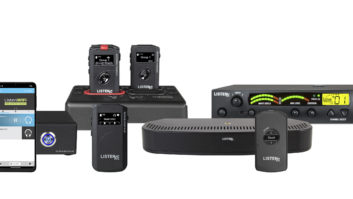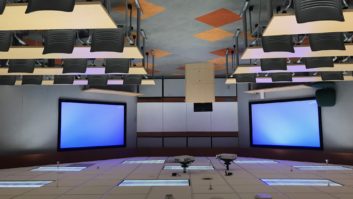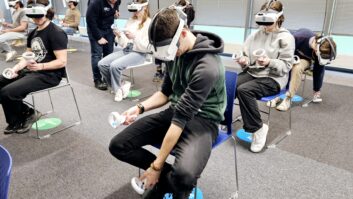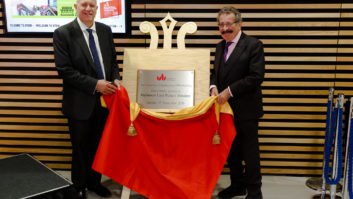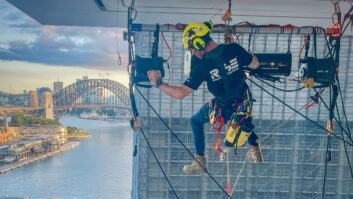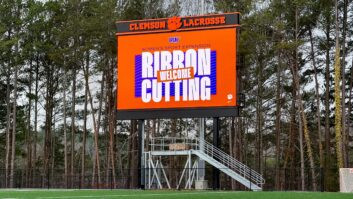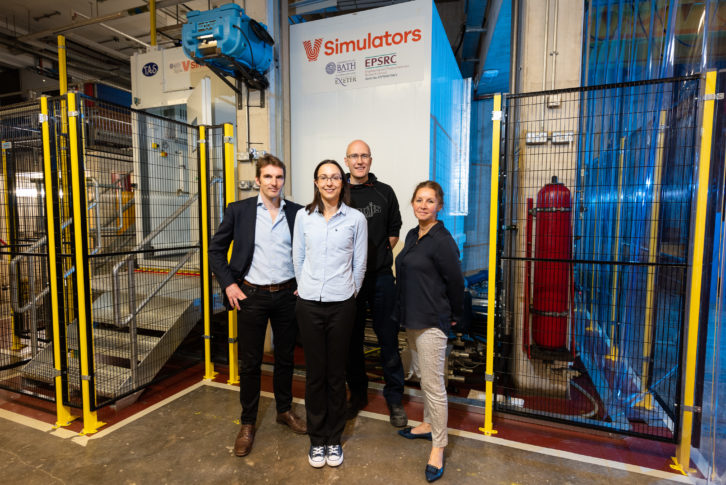
VSimulators is a £4.8 million EPSRC (Engineering and Physical Sciences Research Council) government-funded national research facility, developed between the Universities of Exeter, Bath and Leicester. The first motion platform and environmental control chamber is located at the University of Bath, with a complementary facility to be installed at the University of Exeter.
A few days after the official launch on 9th October, Installation was invited down to the University of Bath to have a look at the new facility and hear more about the University’s studies.
The equipment will support collaborative research across a range of disciplines, including engineering, health, medicine, physiology, architecture and psychology, to explore how people respond to the built environment. For example, VSimulators will be used to explore the effects of motion for occupants in a tall building which sways in the wind. This has been found to lead to tiredness, low mood, and difficulty in concentrating, as well as a lack of motivation for the occupant. Such symptoms can impact negatively on well-being and productivity and, therefore, have an impact for building developers, designers, contractors and owners as well as business occupants.
The VSimulators facility will be used to look at other factors including temperature, light, humidity, sound and air quality, enabling researchers to adjust the environmental conditions and monitor the human responses to help gain a better understanding of how the performance of employees improves or degrades. The VSimulator can go from 40°C down to 10°C to recreate what it would be like in different parts of the world. It is believed that the findings will indicate if air conditioning in office buildings is always necessary and to what degree people can tolerate higher or lower temperatures than we think. The facility will also measure reactions to lighting colour and intensity. Certain colours are synonymous with comfort, but this may impede productivity, whereas others may not be as visually pleasing but improve alertness and concentration.
Perception and acceptance
On the background to the project. Dr Antony Darby, head of civil engineering at the University of Bath, says: “We did some work ages ago on acceptability of motioning grandstands. We had this big bit of grandstand that we built and we had people jumping up and down on it and so on, to try and understand what their perception is of whether it is safe or not.”
This led the team to think on a broader scale and look at the environments within tall buildings. However, Darby and the team discovered “Currently there are no real guidelines on the acceptable level of motion in tall buildings – motion perception but not acceptability.”
To explain the difference, Darby continues: “For example on a train you expect it to move, that doesn’t mean it’s not acceptable. You can perceive the vibration, but it’s an acceptable level, it doesn’t stop you from doing things. And it’s the same thing in a tall building – all buildings move, some more than others, but just because you can see the motion doesn’t necessarily mean it’s unacceptable, or conversely, even if you can’t perceive the motion doesn’t mean it’s acceptable.
“So we designed this bit of equipment to help us explore that and expanded it to consider the entire environment and to make it as realistic as possible and allow us to do as many studies as possible.”
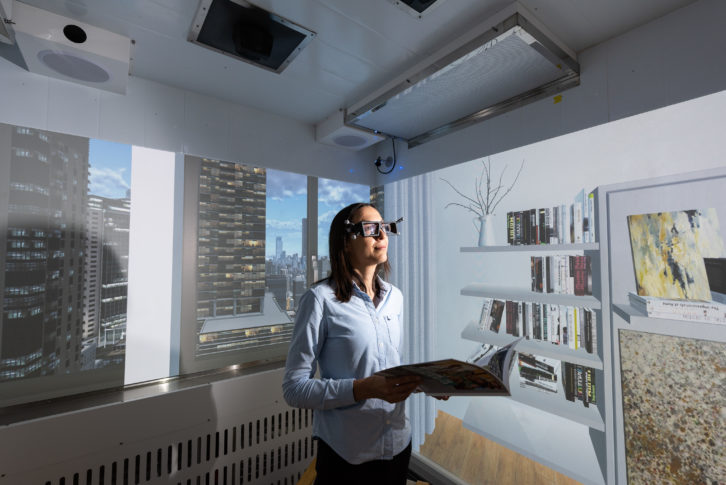
Specialist contractors, working with academic and technical staff at the University of Bath, have designed and constructed the VSimulators facility in the Structures Laboratory at the Department of Architecture and Civil Engineering. This has involved the design and installation of a motion platform by Servotest Testing Systems, a climate chamber designed by Temperature Applied Science and the creation of projected virtual reality environments designed and installed by Antycip. It is anticipated that such research undertaken at the VSimulators facility will impact positively on the design of sustainable buildings with a reduction in wasted energy, alongside positive impacts on productivity and occupant well being.
Servotest are a specialist supplier of custom servo-hydraulic mechanical testing solutions. Using hydraulic actuators, they have designed a platform which can move in three degrees of freedom within bespoke parameters, enabling researchers to take recordings from existing structural motion and replicate within a controlled environment.
Control challenges
“We are delighted to work with the University of Bath to bring into commission their ‘man-rated’, multiaxial simulation table,” comments Andy Prior, managing director from ServoTest. “This project has presented some keen control challenges for us as it requires very smooth operations at low loads. There needs to be very low noise (hydraulic/electrical) and distortion on the acceleration to ensure the test subjects are unaware of the motion simulation. The Servotest team have done a great job to provide technical solutions to these challenges that will provide the most realistic and effective testing for the University.”
The environmental chamber was designed and supplied by Temperature Applied Sciences, which is a UK manufacturer of bespoke Environmental Simulation Systems, with many decades’ of experience. The test chamber supplied to the University of Bath for the VSimulators platform has 14 independent control loops, covering temperature, humidity, air-flow, lighting plus a number of hot and cold radiators, which posed significant and unusual design challenges. All of the environmental variables are under programmable control, simulating an almost infinite variety of day and night scenarios. The remote plant and instrumentation packages are connected to the test chamber via flexible hoses and umbilical cables, while the test chamber has been designed to be rigid and lightweight to withstand the considerable force of the Servotest platform.
“I was very excited to learn that the University of Bath had again selected Temperature Applied Sciences to work on another project,” comments Timothy Stevens, technical director Temperature Applied Science. “The Test Chamber is very much the hub of the VSimulators, whereby all of the technologies converge. We were presented with two distinct challenges. Firstly, the Chamber had to be very light but also very rigid. Secondly, no less than 14 control loops were necessary, all of which had to be under programmable control. Our modular system was perfect for the application and has capacity to spare for any future enhancements.“
Virtual surroundings
The 3D VR environments, created by simulation and virtual reality company Antycip, are projected onto three walls to create a realistic impression of living and working in a building space, including a modern apartment and an office with external views of a low rise city or a dense, high rise city. These scenes will enable participants to experience and respond to virtual surroundings, adjusted according to the time of day.
“Like the other organisations, Antycip is very pleased to be working with the University of Bath on this fascinating VSimulators project,” says Chris Waldron, UK regional manager, Antycip Simulation. “As with many of the professional grade VR projects that we are asked to work on, this came with a set of unique challenges; the image size and nature requirements, the confined area, the angle of projection, and the need to cope with the movement of the platform, all restricted the projector and lens choices, plus created a set of related engineering prescriptions that we had to work to.”
The EPSRC-funded project will also feature a VSimulator platform based at the University of Exeter, which will include a 4×4 metre ‘motion platform’ with in an 8×8 metre room. The
VSimulators facility at the University of Exeter will also offer a fully instrumented floor to record pressure and movement in fine detail, as well as motion capture technology and immersive virtual reality capabilities for up to nine occupants, simultaneously.
www.antycipsimulation.com
www.servotestsystems.com
www.tasltd.co.uk
www.vsimulators.co.uk

